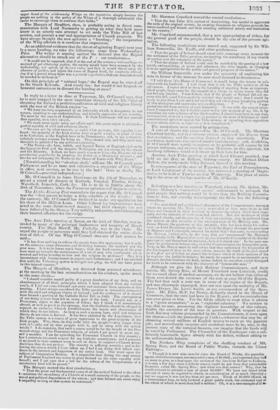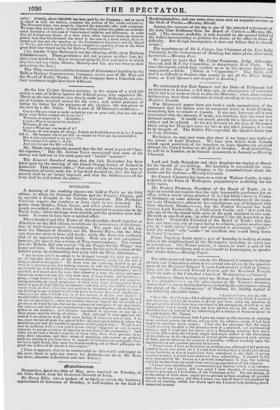Referring to a late meetin4 in Waterford, whereat Mr. Quinn,
Mr. Pierce 11:amity's " accredited ngetit," endeavoured to persuade the good people that nothing could be leAter than the Railway Commis- simmers' line, our evening cuntemporary the G/Jbe has the following remarks- " The accredited and professional adversaries of the Commissioners, amongst whom we perceive 31 r. Bald, opeoly mars!,allail at lost, were there in full force, and Libourect in their vorition to invrease the odium which their inge- nuity and the inifustty of their press hail excited. But the weakness of their combined attacks, and the poverty of their ammunition, may be gathered from the revival on this occasion or the exploded topic of the .11ahtaly note. Mr. James, Dwyer, the great-toe of this assembly, who hi is beLti doing his endea- vour (as Lord Brougham might say ) a kick the Report through the movitices of Munster and Counaught, asserted his belief that ' that note, rt eon iimcmtdmng Mr. Maliony [which note. by the way, does hut recommend' Mr. Maliony] woo actually in the Alton' first tuatk op, but when the Chancellor of the Exche- quer saw it, and discovered its tendency, lie hail it struck out.' In the next sen- tence he professes to believe also, that the Commissioners are honourable men. :Cow, as Mr. Dwyer must lie well aware that they authorized the Chancellor of the Exchequer to (kny in the most solemn mautier the truth of the fuet it in his first uct ttr &lief, we shou!il like to know which of those opinions of his lie requires the public to believe; for surely he cannot be so unreasonable sets demand absolute credence for both, unless, indeed, he coneiders a total disregard fur truth to be consistent with the character of honourable men.'" Although we give the Irish Railway Commissioners, and their patron, Mr. Spring Rice, of Mount Trerichard near Limerick. credit for no small share of modest assurance, we do not believe that either of them ever denied the existence of the note at page 93 of the Report. The fact that such a note was in some of the copies of the Report, and was afterwards expunged, does not rest upon the authority of Mr. James Dwyer, Mr. Lewis Smith, or any correspondent of the Spec. tutor. Mr. Ellis, M. P. for Newry, distinctly stated in the House of Commons, that the note had been in the Report ; and no contradiction was ever given to him. Yet the Globe affects to treat what it admits is a "grave accusation," as an "exploded calumny." We venture to say, that no man, possessing the slightest knowledge of this subject, doubts the existence of the note in question. With respect to the Irish Railway scheme propounded by the Commissioners, it rests upon the chance—(eide the proceedings at Cork)—whatever that may be, of obtaining several millions of English money to carry on the gigantic job; and marvellously satiguine and credulous must he be, who, in the present state of the national finances, can imagine that the funds will be voted by Parliament. The Chancellor of the Exchequer cuts a suf- ficiently lamentable figure already with his deficit, without adding to the unfavourable balance.
The Northern Whig complains of the shuffling conduct of Mr. Spring Rice, and the Board of Public Works, towards the Ulster Railway_ " Though it is now nine months since the Board of Works, the accredite agents of theGovernment, recommended a sum of 40,0001., and regretted they had no more to give, as a loan upon the section of the line from Belfast to Lisburn, it is only a few days since a definite answer could be got from that remarkable financier, called Mr. Spring Rice : and what was that answer? Why, that he would consent to advance a sum of about 16000/! We have not heard what amount of usury he required to clutch, in consideration of so much liberality; but we suppose it was not less than six per cent. Think of 16,000/ offered, as a Government loan, to help forward a great public work, the estimated cost of the whole of which is more than half a million ! Oh, it is a rare example of hie-
rality ! Already, about 100,0001. has been paid by the Company; and as much is called as will, we believe, complete the section of the works referred to. The Directors have, very properly, rejected the miserable offer with contempt. We hope they will do more; we hope they will lay before the public an authenti- cated statement of this case of Government infidelity and dishonour, in order that all Ireland may know, at a time when other national works are contem- plated, how that Government has acted in the case of a work which, be it re- membered, has met the sanction or the Government Engineers and the Board of Wot ks, and which has actually been adopted as a portion of one of the three great Irish lines traced out by the Railway Commissioners."
[Ay. but the Ulster Railway is not the offspring of the great Railway Commissioners. Those gentlemen did not propose another line, be- cause they dared not ; but as to encouraging the best enterprise in which they have not any share, Messrs. Mahony arid Co. are too wise in their generation for that.]
The Whig mentions a similar instance of Government hostility to the Belftst Harbour Improvements Company. on the part of Mr. Rice and the Board of Public Works. Had the company been a Limerick one, their treatment might have been different.



























 Previous page
Previous page